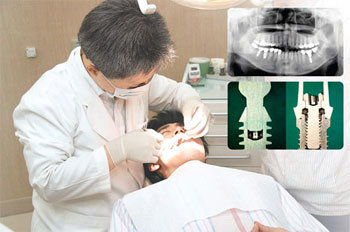Various Dental Implants for All Patients
Various Dental Implants for All Patients
Posted January. 23, 2008 07:38,

In the past, patients with diabetes, high blood pressure, cardiac infarction or poor immune system were not considered appropriate candidates for dental implants. Some people avoided the artificial teeth root replacement for the reason that it didnt look natural. Now, there are several types of dental implants: wedge-shaped implants and laser implant for chronic patients. Meanwhile, an immediate function implant allows the patient to use the tooth immediately after surgery. Patients can select various types of implants based on his or her health and oral condition. In order to minimize side effects and maximize psychological satisfaction, it is important to choose the right type of implant.
○ Wedge-Shaped, Laser Implant for Diabetics
Dental implant procedure involves an incision and the drilling of a hole in the jaw bone, which is often associated with significant pain and blood. For these reasons, patients with diabetes, high blood pressure, cardiac diseases or poor immune systems have avoided dental implants. The success rates of these patients were much lower than those of normal patients.
In theory, if patients suffer severe chronic diseases like diabetes or high blood pressure, they should avoid getting implant surgery. If they still want the surgery, they should consult with experts and choose the proper type of implant such as the wedge-shaped implant or laser implant.
Dental laser is thought to be extremely helpful in surgical procedures since it promotes faster healing of the gums following surgery. But, it is more expensive (about an additional 500,000 won) than ordinary implant procedures which cost about 2 to 3.5 million won. Some dental experts recommend prior consultation with experts for those who want to receive implant surgery, adding that, Not all patients need the laser procedure.
Wedge-shaped implant can be fused into the bone when osteoblasts grow on and into the rough surface of the implanted titanium. This forms a structural and functional connection between the living bone and the implant. Because they are anchored directly into bone, they provide complete stability, in contrast to traditional tooth-replacement alternatives such as dentures. They also minimize bone resorption and atrophy, which can cause inflammation. The procedure is not good for certain implant procedures since it requires enough bone to stabilize the implant and costs about 2 to 3 million won for a single implant operation.
○ Mini Implants for Replacement of Grinding Teeth
Mini implants are also used if there is not enough room for a standard implant. In particular, molar teeth are placed in the back of the mouth where standard implants of 12mm are difficult to implant. Inserting a long implant may cause nerve paralysis by damaging nerves in the anterior portion of the lower jaw. Generally, it takes time and money to transplant bone grafting or bone replacement.
Mini implants, which are 6mm in length, are used for patients without enough gum. Mini implants do not have a long root, as the structure consists of piles of disks to sustain the upper part. This type of structure plays a role to enlarge the surface area between the implant and the teethridge. The drawback of this procedure is shorter durability than ordinary implants. The procedure cost about 2 to 3 million won per single operation.
○ Zirconium Implants for Those Wanting Immediate Function
Front teeth determine a persons first impression because they are easily shown when speaking or laughing. For these reasons, zirconium implants are usually favored by those preparing for a job interview or engaging in social activities.
Immediate function implant allows immediate loading. This means that the patient walks out of the office on the day of surgery which requires implants providing a foundation for attaching permanent artificial teeth. It eliminates two to six months of time that ordinary procedures need for implants to solidify with the gum.
The procedure is not recommended to patients who are suffering gum disease or inflammation. Artificial teeth should be attached in the early stages of the procedure, which weakens the strength of the implants. The procedure is somewhat expensive as a single operation costs about 3.5 million won.
Zirconium implants are made of ceramics which are used for manufacturing tooth pillars and artificial teeth. They are usually used for front teeth and five times stronger than standard metal props. Zirconium produces the best aesthetic effect with natural tooth color by enhancing light transmission. The procedure costs 20 to 30 percent more than ordinary procedures as a single operation may cost up to 5 million won.
○ Silver Implant for Those Wanting Cost-Effective
Getting an implant procedure may be a burden for the elderly who lose their teeth as time goes by. Their weak health conditions make it difficult to endure long operations. In this case, silver implants or a bridge supported by four implants in the upper jaw are effective since they drastically reduce cost. The procedure costs about 8 million won.
For those in their 20s or 30s who have snaggletooth or wisdom teeth, they can resolve their problems without getting implant procedures. If they have decayed molars, pulling wisdom teeth forward can fill the cavity in the gum.
zozo@donga.com







